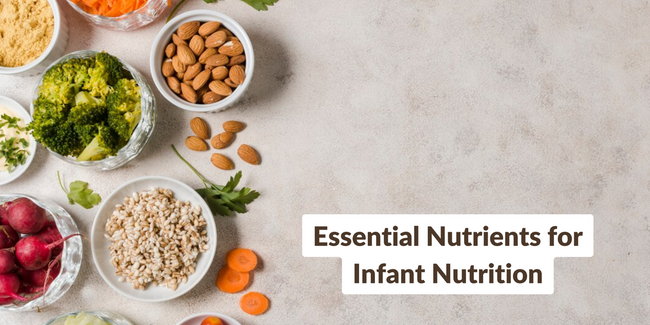
A conscious parent's keen eye on their child’s diet can do wonders for their baby. Once your baby crosses the sixth month, parents are pulled into the maze of figuring out how to make a complete meal for them. Understanding infant nutrition and essential nutrients helps parents not only build a stronger foundation for health but also make the process fun for their young ones.
Importance of Proper Nutrition in Infancy
An organized feeding schedule with equal heed to a baby's hunger cues is integral to an infant's all-round well-being. A proper diet encourages brain development, aiding in the smooth running of cognitive processes and better psychological health. Similarly, it helps with weight gain, ensuring that your baby develops strong bones, height, and energy for growth spurts and activities. By fulfilling the basic guidelines for infant nutrition, parents can ensure a better immune system for their children. A strong immune system helps lower the risk of malnutrition, which can be a leading reason for contracting fatal diseases and stunted growth for both physical and intellectual health.Key Nutrients for Infants and Sources
1. Breast Milk and Formula
Breastmilk is a powerhouse of nourishment for babies. WHO recommends infants be exclusively breastfed until about 6 months. Breastmilk provides immunological benefits and is often called the perfect food for babies since it is loaded with all the nutrients to support a baby's growth.It helps combat diseases and illnesses like asthma, diabetes, gastrointestinal and ear infections, to name a few. Parents are advised to avoid going cold turkey on breastfeeding after the six-month mark. They are encouraged to introduce complementary foods while continuing breastfeeding until the age of two.
Formula is the closest substitute to breastmilk for babies. They are available in a range of choices for babies with sensitive tummies or allergies. FDA-approved formulas on the US market are iron-fortified, contain protein, fat as well as vitamins and minerals to support your infant's growth. However, do take heed of your child’s age and select a formula that is compatible with them with your pediatrician's consult.
2. Macronutrients
Macronutrients are blocks of nutrients that we consume in higher amounts of in our diet. These are mainly carbs, proteins, and fats. These substantial yet necessary portions help in providing energy to the body, maintaining a healthy immune system, and building muscle mass, all of which are necessary for the early years of a child's development.
a. Proteins
During early infancy, a child's protein needs are met through breast milk or formula milk. It is an essential macronutrient that aids in the generation of bodily enzymes and antibodies that maintain and repair tissues, regulate functions and promote overall growth.The average adequate intake (AI) of protein for an infant below the age of 6 months is approximately 9.1 grams per day and 11 grams up until they are a year old.
Notable sources of protein include: meat, egg yolk, fish, yogurt, legumes, cheese, lentils, etc.
b. Carbohydrates
The average adequate intake (AI) of carbs for an infant below the age of 6 months is approximately 60 grams per day and 95 grams up until they are a year old.
Notable sources of carbohydrates include: breastmilk, formula, mashed fruits, pruned sweet potatoes, ragi, beans, jowar, etc.
c. Fats
Apart from providing energy, healthy fats are integral in the development of the central nervous system, hormones, eyes, hair and skin. It facilitates the absorption of fat-soluble vitamins as well as aids in building body mass. Fats are divided into three groups: saturated, unsaturated and trans fats. Healthy fats are a vital part of a child’s diet and should not be restricted.Notable sources of healthy fats include: breastmilk, formula, avocados, artichoke, cheese, whole grains, lean meats, etc.
3. Micronutrients
Differing from macronutrients in their portion size, micronutrients are just as integral to a growing infant's diet. Derived from our structured diets, these micronutrients facilitate the production of hormones, enzymes to build immunity, maintain metabolism, and support development.
a. Iron
Iron is a mineral that helps in the production of hemoglobin, which carries oxygen in the red blood cells throughout the body. An absence of iron in a child's diet may cause fussiness, slow weight gain, anemia, paleness, etc. Breast milk is a go-to source for iron up until the age of 6 months, after which parents can look out for iron-fortified formula until they are one.The average adequate intake (AI) of iron for an infant below the age of 6 months is approximately 0.27 mg per day and 11 mg up until they are a year old.
Other notable sources of iron include: meat, whole grain breads, cereals, dark green vegetables, etc.
Here are a few iron-rich vegetarian food recipes.
b. Calcium
It is common knowledge that calcium is the powerhouse of a mineral for building strong bones and structures in childhood. Another fact of the matter is that this mineral is integral to muscle contraction, nerve health, and blood clotting. It is always recommended that we ensure our iron intake is at the recommended level to prevent the body from absorbing it from our bones. Lack of calcium in an infant's diet may cause rickets, bone mass issues, vitamin D deficiency, etc.The average adequate intake (AI) of calcium for an infant below the age of 6 months is approximately 210 mg per day and 270 mg up until they are a year old.
Notable sources of calcium include: breastmilk, formula, yogurt, tofu, cheese, green leafy vegetables, etc.
Here are a few calcium-rich recipes.
c. Vitamins
Vitamins are nutrients that support various functions in the development of the human body. There are a total of 13 vitamins that are essential for growth. Some of them include vitamins A, C, D, E, K, B12, folate and so on.To dive into detail on a few, vitamin D can be derived from optimal sun exposure and is integral to the development of bones. Vitamin C is an antioxidant. It boosts healing and helps the body produce collagen, which is essential for maintaining muscle and tissue health. For infants other than breastmilk, its sources include citrus fruits, tomatoes, potatoes, etc.
Another essential vitamin is folate. It helps maintain the health of the nervous system and blood cell production. Parents can include wholegrain breads, legumes and potatoes in their child's diet to get the most of the nutrient.
d. Zinc
There’s not one thing that this mineral does not do. An adequate amount of zinc in a child’s diet makes for a healthy immune system, keeping diseases like diarrhea, malaria and pneumonia at bay. It promotes wound healing and stimulates a sense of taste.The average adequate intake (AI) of zinc for an infant below the age of 6 months is approximately 2 mg per day and 3 mg up until they are a year old.
Notable sources of calcium include: breastmilk, formula, meat, zinc-fortified infant cereals, fish, legumes, etc.
We recommend speaking to your healthcare provider in detail about what might be needed to be added to your growing child's diet. Keeping these in mind, creating a whole meal that supports all the components of an infant’s nutrition can be tricky. Here’s where we come in. Feeding trackers and age-appropriate recipes on the BabyG app can help you make the experience fun while documenting what clicks with your baby. A help along the way, so to speak. Happy Parenting!





LEAVE A COMMENT